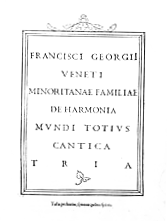Francesco Giorgi
Francesco Giorgi Veneto[1] (1466–1540) was an Italian Franciscan friar, and author of the work De harmonia mundi totius from 1525. The Cambridge History of Renaissance Philosophy describes him as 'idiosyncratic'.[2] He wrote also In Scripturam Sacram Problemata (1536).
Giorgi is extensively discussed in Frances Yates, The Occult Philosophy in the Elizabethan Age
That Giorgi was a Christian Cabalist is a statement that means, not merely that he was influenced vaguely by the Cabalist literature, but that he believed that Cabala could prove, or already had proved, the truth of Christianity.[3]
She also discusses Shakespeare's The Merchant of Venice in the light of the theory of Daniel Banes that Shakespeare was familiar with Giorgi's and related writings on the Cabala.[4]

A copy of De harmonia mundi is listed as once in the Library of Sir Thomas Browne. It is possible that Browne's copy was bequeathed to him from Arthur Dee. John Dee is also known to have possessed a copy of Giorgi's work.
Notes
- Also called Giorgio, Zorzi.
- p. 357. Also (p. 69) the CHRP talks of Giorgi as a synthesizer of the pia philosophia of Ficino, and the concordia of Giovanni Pico della Mirandola (along with Henricus Cornelius Agrippa and Paracelsus); on p. 312 he is classed with Ficino and Nicolas of Cusa as subscribing to a macrocosm and microcosm theory.
- Frances Yates, The Occult Philosophy in the Elizabethan Age (1979) chapter 4
- Frances Yates, The Occult Philosophy in the Elizabethan Age (1979) chapter 12
Bibliography
- Francesco Zorzi, L'armonia del mondo, a cura di Saverio Campanini, testo latino a fronte, coll. "Il Pensiero Occidentale", Bompiani, Milano 2010.
- Francesco Giorgio Veneto, De harmonia mundi, pref. Cesare Vasoli, Lavis-Firenze, La Finestra editrice-Biblioteca Nazionale Centrale di Firenze, 2008, ISBN 978-88-88097-75-6; ISSN 1973-1337.
- Saverio Campanini, Francesco Giorgio’s Criticism of the Vulgata: Hebraica Veritas or Mendosa Traductio? in G. Busi (ed.), Hebrew to Latin, Latin to Hebrew. The Mirroring of Two Cultures in the Age of Humanism, Berlin Studies in Judaism 1, Nino Aragno Editore, Turin 2006, pp. 206–231.
- Saverio Campanini, Ein unbekannter Kommentar zum „Hohelied“ aus der kabbalistischen Schule von Francesco Zorzi: Edition und Kommentar, in G. Frank – A. Hallacker – S. Lalla (edd.), Erzählende Vernunft, Akademie Verlag, Berlin 2006, pp. 265–281.
- Saverio Campanini, Le fonti ebraiche del De Harmonia mundi di Francesco Zorzi, in «Annali di Ca' Foscari», XXXVIII, 3 (1999), pp. 29–74.
- Saverio Campanini, Haophan betoc haophan. La struttura simbolica del De Harmonia mundi di Francesco Zorzi, in «Materia Giudaica», 3 (1997), pp. 13–17.
- Giulio Busi, Francesco Zorzi. A Methodical Dreamer, in The Christian Kabbalah. Jewish Mystical Books and their Christian Interpreters, edited by J. Dan, Cambridge (Ma.), Harvard University Press, 1997, p. 97-125.
External links
- De harmonia mundi totius cantica tria, Venetiis, in aedibus Bernardini de vitalibus chalcographi, 1525. Digitized version of the copy at the National Library of Finland, perhaps the only known uncensored copy.
- De harmonia mundi totius cantica tria, Parisiis 1545. Digital library of the French National Library. (The same copy can be found on the Internet Archive.)